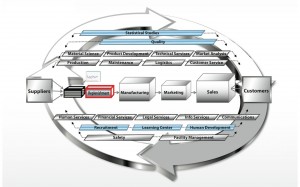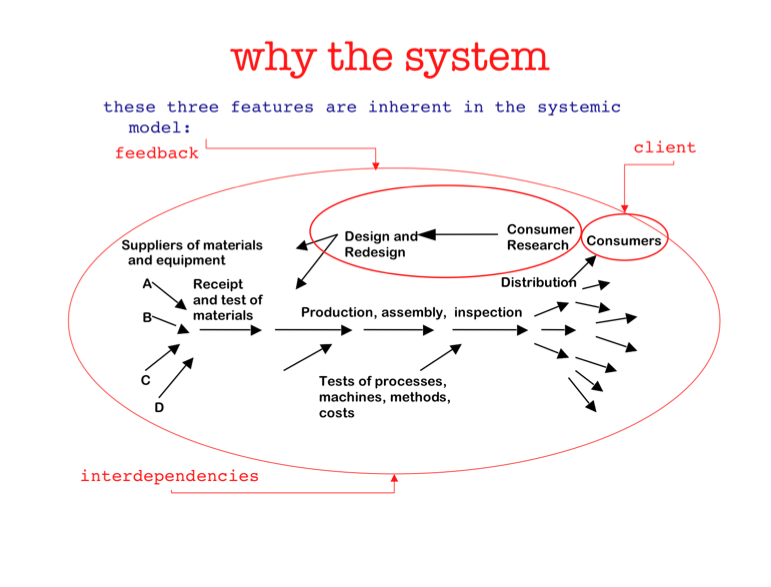 Most organizations (and business schools) are lagging behind the times as they still work in silos, missing completely the challenge and opportunity of the complexity that now dominates our world. We need to manage organizations as whole systems. Those who don’t know what that entails need to catch on, catch up and embrace a new learning path.
Most organizations (and business schools) are lagging behind the times as they still work in silos, missing completely the challenge and opportunity of the complexity that now dominates our world. We need to manage organizations as whole systems. Those who don’t know what that entails need to catch on, catch up and embrace a new learning path.
Seeing the Whole System
The need to transform our way of managing was seen long ago. We can thank W. Edwards Deming for pointing this out relentlessly. When we first started our firm in Italy in the mid 1990s it was to work with Deming’s principles about Quality. But Quality was only a part of the picture. Deming’s philosophy is all about transformation. Transformation of the prevailing management style based on hierarchy and artificially created silos towards one of system optimization. In other words, it was a complete shift of paradigm and practice.
Deming’s approach was clearly systemic. It looked at the big picture of how elements of a system interdepend. This can be seen from his diagram from the 1950s, Production Viewed As A System (see diagram below). Managers and organizations are generally not taught to think in this way, even today. Organizations are still largely run in silos, with policies that bolster artificial barriers, and much of this is driven by the limited logic of cost accounting.
Peter Senge and Deming
Peter Senge’s book ‘The Fifth Discipline’ published in 1990 promotes a Systems Thinking approach for organizations to become ‘learning organizations’ and drew attention to the crucial importance of dealing with mental models. The influence of Deming seemed clear, but was apparently a coincidence. The absence of Deming was corrected in the Revised Edition where Senge expresses his heartfelt and unbridled respect for Deming. He fully acknowledges Deming’s Theory of Profound Knowledge based on theory of variation (statistical theory and method), understanding a system, theory of knowledge and psychology. Senge firmly states the overlap between Deming and a systemic approach to managing organizations.
Deming and Goldratt
When our founder, Dr. Domenico Lepore, trained with Oded Cohen at the Avraham Goldratt Institute in the UK, a deep level of connection emerged. The focus required to manage an organization as a system, as Deming had proposed, could be greatly increased by identifying the constraint of the organization, as proposed by Goldratt (see red box in diagram below). Moreover, the psychological and cognitive challenges of implementing Deming’s philosophy, especially the identifying and challenging of mental models, could be systematically addressed through the Thinking Process Tools developed by Goldratt. At the same time, greater stability and predictability could be introduced to constraint management through understanding, measuring and managing variation.
A unifying design for complexity
This synergy of approaches was published by Larry Gadd, Goldratt’s publisher in 1999 as ‘Deming and Goldratt: The Decalogue’ by Domenico Lepore and Oded Cohen. Larry Gadd saw the potential of bringing the two approaches together to create “a new level of accessibility.” In the following years Dr. Lepore and his team led numerous implementations of the Decalogue whole system management methodology in a wide range of organizations. Gradually a further dimension in this approach was to emerge. Thanks to the number of physicists involved directly and indirectly in our firm, the relevance of Network Theory to a systemic approach became evident. The Decalogue methodology that embraced the philosophies and theories of Deming and Goldratt grew to encompass the notion of network as a new organizational design: the network of projects. An organization can be designed as a network of projects with a strategic hub (constraint) and statistical methods can be used to create greater stability among the nodes. (See Lepore ‘Sechel: Logic, Language and tools to Manage Any Organization as a Network’.) This design equips organizations with the philosophy, method and tools to govern complexity and manage human interdependencies that are interconnected through projects.
Changing the business curriculum
The philosophy for systemic management has been with us for decades, but there is a cognitive time lag. We still have to catch up with the emotional difficulties of abandoning traditional hierarchies and silo thinking. This is the challenge. Peter Senge quotes Deming as saying “We will never transform the prevailing system of management without transforming our prevailing system of eduction. They are the same system.”
There is a long road ahead to overcome the mindset that was appropriate for the 19th century industrial age but not for our age of complexity. Thanks to the work of Deming, Goldratt and all those committed to bringing a systemic view to management and education, that journey has begun. In the meantime, we propose a new curriculum for leaders and managers to place them on a learning path appropriate for the 21st century, illustrated in the diagram below. We will look at this in more detail in our next post.
‘About the Author
Angela Montgomery Ph.D. is Partner and Co-founder of Intelligent Management, founded by Dr. Domenico Lepore. Intelligent Management specializes in Whole System Transformation.
Angela’s new business novel+ website The Human Constraint looks at how Deming and the Theory of Constraints can create the organization of the future, based on collaboration, network and social innovation.








Hi Angela
I really enjoy reading your articles.
We are company BOXARR and we have developed a software to model inter-dependencies and complexities within organisations and businesses. If you are interested to find out more, please visit our website.
Would be great to stay in touch.
Regards
Ilona
Hi Llona,
Thanks for reaching out and letting me know about your great company. I think there could be really good synergies with what we do because we help orgs understand how to manage operationally based on interdependencies. I’ve connected with your Founder Ian Poccachard on LinkedIn and I hope he replies to my message there so we can start a conversation about possible interactions.
All best,
Angela
http://www.intelligentmanagement.ws